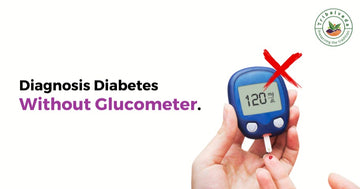Easiest Way to Diagnosis Diabetes or Prediabetic Stage Without Glucometer.
by Tribal Veda on Oct 07, 2023
Diabetes, a chronic condition that affects millions worldwide, often remains undiagnosed until complications arise. The key to managing diabetes effectively is early detection, which begins with recognizing the symptoms. In this informative guide, we'll explore the common signs of diabetes and how you can perform a preliminary diagnosis without medical equipment.
Understanding the Symptoms
Diabetes, a chronic condition affecting millions worldwide, often remains undiagnosed until complications arise. Early detection is key to effective management, starting with recognizing the symptoms. According to the Centers for Disease Control and Prevention (CDC), more than 34 million people in the United States have diabetes, and approximately 88 million adults have prediabetes. These statistics highlight the importance of awareness and early detection
- Frequent Urination (Polyuria): One of the hallmark symptoms of diabetes is frequent urination. Excess sugar in the blood draws more water into the kidneys, resulting in increased urine production. If you find yourself visiting the bathroom more often, it could be a red flag.

- Excessive Thirst (Polydipsia): With increased urination comes excessive thirst. Your body attempts to compensate for fluid loss, leading to a persistent sensation of dry mouth and a heightened need to drink fluids.

- Unexplained Weight Loss: Unexpected weight loss can be a sign of diabetes, especially when it occurs despite normal or increased food intake. The body's inability to effectively use glucose for energy can lead to the breakdown of muscle and fat tissues.

- Fatigue: Feeling unusually tired, even after a full night's sleep, can be attributed to diabetes. Glucose is essential for providing energy to your body's cells. Fatigue can set in when it's not properly utilized due to insulin resistance or insufficient insulin production.

- Blurred Vision: Diabetes can affect the eyes. High blood sugar levels can cause changes in the shape of the eye's lens, leading to blurred vision. If you notice sudden changes in your eyesight, seeking medical attention is essential

- Slow Wound Healing: Diabetes can impede the body's ability to heal wounds. If cuts or sores take longer than usual to heal, it could be due to elevated blood sugar levels.

Performing a DIY Diagnosis
While self-diagnosis should not replace a professional medical evaluation, it can provide valuable insights into your health. Here's how you can perform a preliminary check for diabetes at home:
Recognize the Symptoms: Pay attention to the symptoms mentioned earlier. If you experience several of them, consult a healthcare provider promptly.
Monitor Your Blood Sugar: You can purchase a glucometer, a device that measures blood glucose levels, at most pharmacies. Follow the manufacturer's instructions to check your fasting blood sugar level in the morning before eating. A fasting blood sugar level of 100-125 mg/dL may indicate prediabetes, while levels of 126 mg/dL or higher suggest diabetes.
Assess Your Risk Factors: Consider your risk factors for diabetes. These include family history, age, obesity, physical inactivity, and a diet high in processed sugars. If you have multiple risk factors, it's advisable to be vigilant and seek professional guidance.
Urine Test: While not as accurate as a blood test, a urine test using test strips designed for glucose can indicate high sugar levels. If your urine consistently shows elevated glucose, it's essential to consult a healthcare professional.
Managing Diabetes Symptoms
Once you've recognized the symptoms and received a professional diagnosis, managing diabetes becomes crucial. Proper management can prevent complications and improve your overall well-being. Here are some essential strategies:
-
Diet and Nutrition: Consult a registered dietitian to develop a balanced meal plan considering your blood sugar levels. Avoid excessive sugar and focus on whole grains, lean proteins, fruits, and vegetables. As mentioned in our previous blog, "The Power of Jamun," incorporating Jamun and products like Jamun Seed Powder can aid glycemic control.
-
Physical Activity: Regular exercise helps lower blood sugar levels and improves insulin sensitivity. Engage in activities you enjoy, such as walking, swimming, or cycling. Aim for at least 150 minutes of moderate-intensity exercise per week.
-
Medications and Insulin: Your healthcare provider may prescribe medications or insulin therapy to manage diabetes. Follow their recommendations carefully and monitor your blood sugar levels as advised.
-
Regular Monitoring: Monitor your blood sugar levels to track your progress and make necessary adjustments to your treatment plan.
-
Stress Management: High-stress levels can affect blood sugar—practice relaxation techniques like meditation, deep breathing, or yoga to manage stress effectively.
Recognizing the symptoms of diabetes, performing a preliminary self-check, and seeking professional diagnosis and guidance are crucial steps in managing this chronic condition. Early intervention and effective symptom management can significantly improve your quality of life. Remember that a healthy lifestyle, proper nutrition, and medication as prescribed are key components of successful diabetes management.
If you suspect you have diabetes or are at risk, seek professional guidance promptly to manage your health and well-being effectively.
**Disclaimer: The diabetes DIY diagnosis provided here is solely for informational purposes and is intended to raise awareness about potential diabetes-related symptoms and risk factors. It is not a substitute for professional medical advice, diagnosis, or treatment. We do not endorse or provide approval for any self-diagnosis. It is imperative that individuals who suspect they may have diabetes or have concerns about their health consult a qualified healthcare professional or a doctor for a comprehensive evaluation, diagnosis, and personalized guidance on managing their diabetes or any other medical condition. Your health is of utmost importance, and seeking professional medical care is essential for an accurate diagnosis and appropriate treatment plan.




